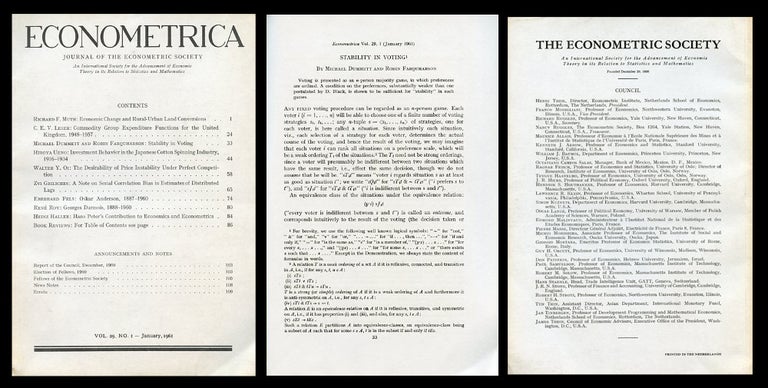Stability in Voting in Econometrica, Vol. 29, No. 1, January 1961, pp. 33-43
New Haven: Yale University, 1961. 1st Edition. FIRST EDITION IN ORIGINAL WRAPS OF AN INFLUENTIAL PAPER ON THE THEORY OF VOTING, THE DUMMETT-FARQUHARSON THEORY. This paper “worked on the theoretical aspects of aggregation of individual preferences and on the strategic aspects of voting theory”, provided an extended version of Duncan Black’s single-peakedness theories, and argued “that deterministic voting rules with more than three issues faced endemic strategic voting” (Salles, Michael Dummett on Social Choice and Voting, Research Gate, February 2006; Wikipedia).
Specifically, Dummett and Farquharson conjectured that “Voting is presented as an n-person majority game, in which preferences are ordinal. A condition on the preferences, substantially weaker than one postulated by D. Black, is shown to be sufficient for ‘stability’ in such games” (Dummett & Farquharson, p. 33).
“In this paper, Dummett and Farquharson conjecture Gibbard’s theorem. Furthermore, they prove the existence of maximal elements (tops of the social domination relation) for majority games (different from a majority rule essentially in the treatment of individual indifference) when individual preferences satisfy a condition analogous to single-peakedness but weaker than single-peakedness.
“Precisely, one can read ‘We cannot assume that each voter’s actual strategy will be determined uniquely by his preference scale. This would be to assume that every voter votes “sincerely,” whereas it seems unlikely that there is any voting procedure in which it can never be advantageous for any voter to vote’“ strategically,” i.e., non-sincerely. A general proof of this conjecture was given by Gibbard only in 1973 and by Satterthwaite in 1975” ( Salles, The Best Voting Method, Social Choice and Welfare, 337).
“Nakamura proved Dummett and Farquharson’s result for all proper simple games and Salles and Wendell used the similarity between Dummett and Farquharson’s condition on preferences and quasi-concavity of utility functions in dimension 1 to extend some of Nakamura’s theorems” ( Salles, The Best Voting Method, Social Choice and Welfare, 337).
Sir Michael Anthony Eardley Dummett (1925-2011) was a British philosopher, logician, and mathematician who did important work on voting theory and systems. His obituary described him as "among the most significant British philosophers of the last century and a leading campaigner for racial tolerance and equality” (Obituary, Sir Michael Dummett, 28 December 2011). Reginald Robin Farquharson (1930-1973) “was an academic whose interest in mathematics and politics led him to work on game theory. He wrote an influential analysis of voting systems” (Wikipedia). Item #946
CONDITION & DETAILS: New Haven: Yale University. 4to (10 x 7 inches; 250 x 175mm). First edition in original printed wraps. Complete. [1], 109, [7]. Very slight toning at the edges. Near fine.
Price: $600.00

